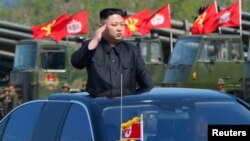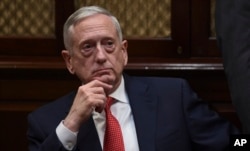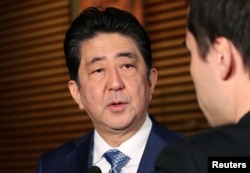President Donald Trump said "we will take care of it" after North Korea launched yet another intercontinental ballistic missile Tuesday, defying sanctions and world condemnation.
"It is a situation we will handle," the president told reporters at the White House, without being specific. But he did say the U.S. approach toward North Korea had not changed.
Defense Secretary Jim Mattis said this missile flew longer and higher than any North Korean missile previously tested. He called it part of North Korea's efforts to build missiles that can "threaten everywhere in the world." Mattis said North Korea was a danger to world peace.
The Pentagon's initial assessment was that North Korea fired the ICBM from Sang Ni, north of Pyongyang. It flew about 1,000 kilometers (620 miles) before dropping into the Sea of Japan, in Japan's exclusive economic zone, which is sovereign Japanese territory.
The Union of Concerned Scientists said that if the Pentagon's assessment was accurate, the missile would have enough range to strike anywhere in the continental United States, including Washington. But it said such a missile would be unable to carry a nuclear warhead because the weapon would be too heavy.
Japanese Prime Minister Shinzo Abe asked for an emergency meeting of the U.N. Security Council and vowed to protect the Japanese people.
"We can never accept this violence and have strongly protested to North Korea," Abe told reporters.
The Security Council confirmed it would meet at 4 p.m. Wednesday.
Trump spoke to Abe by telephone. The White House said they agreed that North Korea's actions were undermining North Korea's own security and were further isolating it from the international community.
Trump also talked with South Korean President Moon Jae-in, who, along with Trump, said the North's missile launches were a grave threat not only to South Korea and the U.S. but to the entire world.
Britain's U.N. Ambassador Matthew Rycroft called the launch "another reckless act by a regime that is more intent on building up its ballistic missile and nuclear capability than it is on looking after its own people."
This was the first North Korean missile test since September and the first since the U.S. put the North back on its list of state sponsors of terrorism. The pause in missile tests after a spate of them earlier this year led some analysts to speculate that North Korean leader Kim Jong Un was holding out a sliver of goodwill toward the U.S.
Some experts said they thought he had decided to freeze test flights at least until after February's Winter Olympics in PyeongChang, South Korea.
"We should have known better than to think there was any particular conclusion to draw from 60-plus days of quiet," Robert Manning of the Atlantic Council told VOA. He said that getting worked up every time Kim makes a move was dumb and made Kim look like a victim and the one who was threatened.
"Trump's hysterical, ridiculous tweets and taunting of Kim were key instigators in creating this pseudocrisis atmosphere," Manning said.
The latest North Korean launch came as the U.S. and South Korea were preparing a joint exercise called “Vigilant Ace” for December 4-8, with thousands of military personnel and more than 230 aircraft, including six F-22 Raptor fighter jets deployed to South Korea for the first time.
Pyongyang routinely condemns such military drills, using belligerent language and military threats.
VOA's Nike Ching, Carla Babb, Jeff Seldin, Steve Herman, Daniel Schearf and Margaret Besheer contributed to this report.







